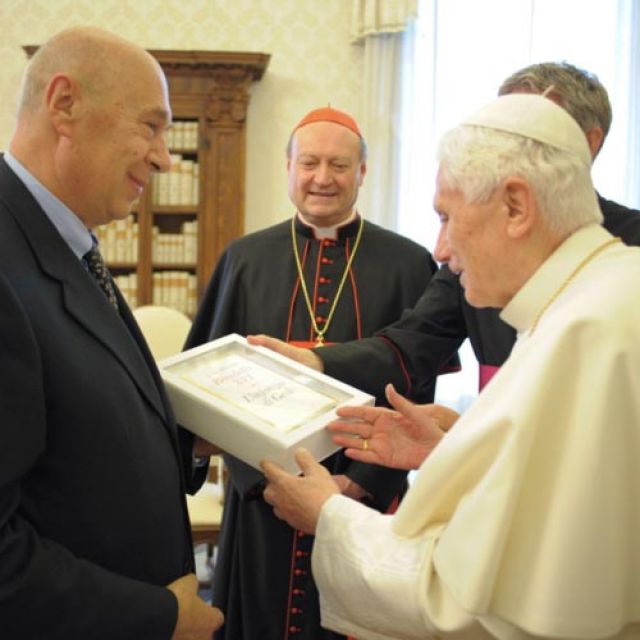“Luke dispels a mythical reading that is often made of the Gospels and historically contextualizes the life of John the Baptist,” the Holy Father said. “‘In the 15th year of Tiberius Caesar, when Pontius Pilate was governor ... during the high priesthood of Annas and Caiaphas’ (Lk 3:1-2). Within this historical framework lies the true great event, the birth of Christ, which his contemporaries will not even notice. By God the great men of history form the backdrop to the small!”
The great men of history form the backdrop to the small! That could be a summary of the whole of Advent and Christmas. The archangel comes to the unknown virgin of Nazareth and reveals that the great king, long desired by Israel and destined to rule over all nations, will be conceived with her permission. The star appears to the Magi from the east, and they come in search of a newborn king, not born in the royal palaces of Jerusalem, but in a stable at Bethlehem. The great men of history are noted in the “infancy narratives” of Matthew’s and Luke’s Gospels, but they are not in the foreground, their action is not relevant. It is the small men, unnoticed and apparently insignificant, who are the agents of God’s saving purposes.
One of our Advent companions is a small man of history: St. Joseph, the husband of Mary, the legal and apparent father of the baby Jesus. St. Joseph is just one of a number of figures who come alive in a fresh way in the third and final volume of Pope Benedict’s Jesus of Nazareth.
This slim volume, entitled The Infancy Narratives, is a complement to the previous two magnificent volumes on the life of Jesus, the first on His public ministry and the second on Holy Week. Every Catholic home should have a copy of this latest from Pope Benedict who, with his Jesus of Nazareth trilogy, has become the living embodiment of the renewal in Christian biblical scholarship that the Church has desired for over a century.
“The designation of Joseph as a just man (in Matthew 1:19) extends far beyond the decision (not to put Mary to shame),” writes Benedict. “It gives an overall picture of St. Joseph and at the same time it aligns him with the great figures of the Old Covenant — beginning with Abraham, the just. If we may say that the form of piety found in the New Testament can be summed up in the expression ‘a believer,’ then the Old Testament idea of a life lived according to Sacred Scripture is summed up in the idea of a ‘just man.’ Psalm 1 presents the classic image of the ‘just’ man. We might well think of it as a portrait of the spiritual figure of St. Joseph.”
That’s Joseph Ratzinger — studying and praying over the Scriptures for 70 years now — at his best, reading the Word of God in the whole history of faith. That little word “just” opens the entire horizon of the Old Covenant encountering the new. And what a novelty God has for Joseph!
“Whereas the angel ‘came’ to Mary, he merely appears to Joseph in a dream — admittedly a dream that is real and reveals what is real,” Benedict writes. “Once again this shows us an essential quality of the figure of St. Joseph: his capacity to perceive the divine and his ability to discern. Only a man who is inwardly watchful for the divine, only someone with a real sensitivity for God and His ways, can receive God’s message in this way. … The message conveyed to Joseph is overwhelming, and it demands extraordinarily courageous faith. Can it be that God has really spoken, that what Joseph was told in the dream was the truth — a truth so far surpassing anything he could have foreseen? Can it be that God has acted in this way toward a human creature? Can it be that God launched a new history with men?”
In Benedict’s hands, the dream of Joseph is no sleepy affair, but a great dramatic moment, pregnant with the promise of an entirely new world. Yes, God has really spoken. Yes, it is true. Yes, God has acted. Yes, God has launched a new history. And He has done so not with the great men of the old history, but with the small men of the new.

